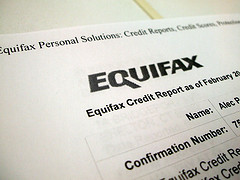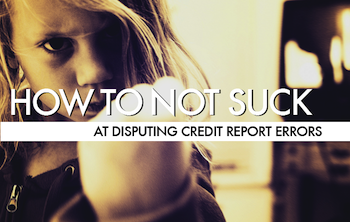Like it or hate it, your credit report and credit score have lots of power. These may determine whether or not you’re approved for a mortgage, car loan, or other borrowing, and will determine the interest rates on your credit cards. This information is often even used when you’re evaluated for an apartment, insurance or a job, or try to get a bank account. That’s why it’s incredibly important to check your credit report for errors, as mistakes on your report can haunt every part of your financial life for years. [More]
transunion

Companies That Furnish Info For Credit Reports Are Obligated To Investigate Disputes
More than 1-in-4 credit reports contain some sort of error, according to a recent Federal Trade Commission report, but one can’t lay all the blame at the feet of the three major credit bureaus — Experian, TransUnion, Equifax — as the companies that supply this information are not always fulfilling their legal obligation to investigate disputes by consumers. [More]

Bill Would Allow Consumers To Get Free Credit Score When Receiving Free Credit Reports
Right now, U.S. consumers can check each of their three credit reports — from TransUnion, Equifax, and Experian — once a year for free through AnnualCreditReport.com, but getting your actual credit score will probably cost you. Legislation introduced today seeks to remedy this issue. [More]

This Valentine’s Day, Tell Congress You’d Really Love Access To A Free, Reliable Credit Score
While the three major credit bureaus each allow you to access your credit report once a year at no charge through annualcreditreport.com, getting your actual credit score will likely cost you some money. [More]

Study: Errors Found In As Many As 26% Of Consumers’ Credit Reports
You should really check your credit reports at least once a year. If you don’t believe us, you should check out the results of the Federal Trade Commission’s latest study, which shows just how rife with errors the reports from Experian, Equifax, and TransUnion can be. [More]

Who Is Responsible When Your Credit Report Flags You As A Possible Terrorist?
We’ve told you before about consumers who ended up being denied for loans and facing public embarrassment because their credit report included a note that the person might be a terrorist or an international drug trafficker. But no one seems to want to take the blame for when this kind of mistake happens. [More]

Chase Damages Woman’s Credit Report With $16,159 Error, Doesn’t Really Care
Imagine waking up one day and finding out that you can’t get a credit card because someone at the bank screwed up and told the credit reporting agencies that you owed more than $16,000 to Chase. You’d think that this could be easily resolved — but apparently not without getting the local news involved. [More]

CFPB: Credit-Reporting Firms Often Ignore Consumers’ Evidence In Report Disputes
If you’re included in the one in five consumers who obtain an annual credit report, perhaps you’ve noticed an error in your report and have tried to get that fixed. But the Consumer Financial Protection Bureau says that could be an exercise in futility, as the three major credit-reporting firms might not be paying attention to any information you submit to make your case. [More]

CFPB Gives You Place To File Complaints About Credit Bureaus
Credit reporting agencies like TransUnion, Experian, and Equifax, provide reports and credit scores that effectively tell lenders what sort of human being you are. The amount of authority they have in a consumer’s life is astounding, especially when you consider the lack of oversight they’ve enjoyed. At least now the Consumer Financial Protection Bureau is looking over their shoulder, and giving consumers a way to file complaints. [More]

One-In-Five Consumers Seeing Significantly Different Credit Scores Than Creditors
Much is made about how much impact your credit scores has on your ability to get a loan, live a happy life and be a good human being. But a new report from the Consumer Financial Protection Bureau claims that one-in-five consumers are seeing scores that are significantly different from what lenders see. [More]


